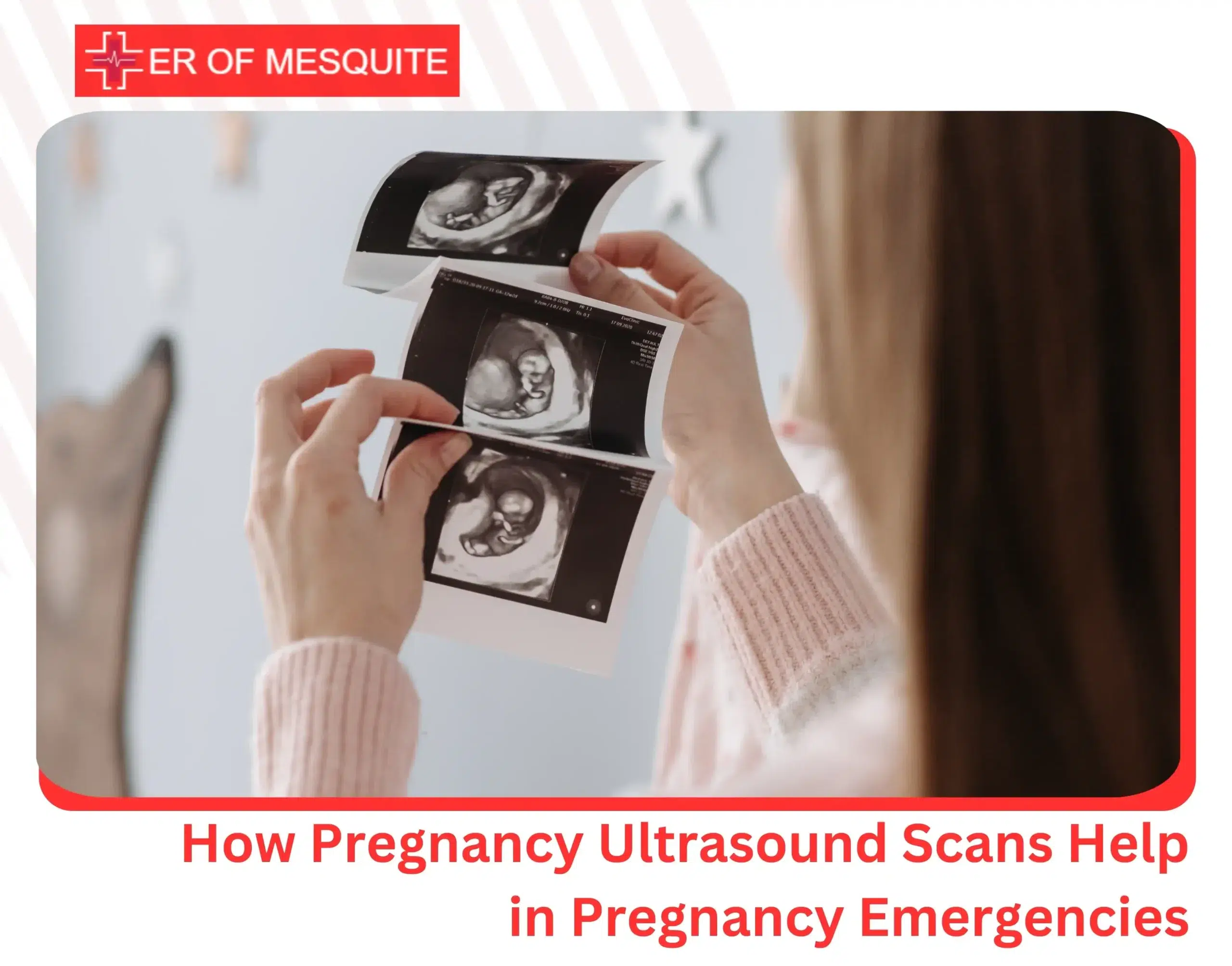Pregnancy is a journey of joy and anticipation, but unexpected complications can arise at any moment. When emergencies threaten the health of mother or baby, rapid diagnosis becomes crucial. That’s where pregnancy ultrasound plays a vital role, offering immediate insights without any radiation risks.
While routine care typically includes one scan per trimester, emergency situations may require additional ultrasounds. Let’s explore how early pregnancy ultrasound helps protect both you and your baby during pregnancy emergencies.
When Do You Need Emergency Ultrasound for Pregnancy?
Pregnancy emergencies can arise without warning, from severe abdominal pain to unexplained bleeding. Our emergency room is equipped with advanced ultrasound technology, including traditional 2D, detailed 3D imaging, and Doppler blood flow scanning, to quickly diagnose these urgent situations.
1. Abdominal Pain
Pregnancy can bring various types of abdominal pain – some normal, others concerning. When severe pain strikes, ultrasound helps quickly determine whether you’re experiencing a serious complication or common pregnancy discomfort.
Common causes of abdominal pain that ultrasound can detect:
- Organ issues (appendicitis, gallbladder problems)
- Internal bleeding
- Round ligament pain
- Severe UTI (urinary tract infection)
Ultrasound also rules out pregnancy-specific complications like ectopic pregnancy or early signs of miscarriage. Since it uses only sound waves, this imaging is completely safe for both mother and baby, making it our go-to diagnostic tool for pregnancy emergencies.
2. Miscarriage Evaluation
Miscarriage, also known as spontaneous abortion, refers to the termination of pregnancy before 20 weeks. When bleeding or severe cramping occurs during early pregnancy, an emergency ultrasound can quickly determine your baby’s status. This critical scan checks for your baby’s heartbeat, signs of normal development, and any visible complications that might threaten the pregnancy.
During these frightening moments, pregnancy ultrasound provides vital information within minutes. If the pregnancy is viable, we can often reassure you immediately. Even in cases where complications are found, early detection helps your healthcare team provide the most appropriate care and support.
3. Ectopic Pregnancy Detection
Ectopic pregnancy occurs when a fertilized egg implants outside the uterus, usually in the fallopian tube. This life-threatening emergency requires immediate detection and treatment. Emergency ultrasound plays a crucial role by quickly locating the pregnancy and assessing its impact on surrounding tissues.
Time is of the essence in these situations. Early pregnancy ultrasound allows our emergency team to begin appropriate treatment before complications become severe.
4. Placental Abnormalities
The placenta is part of the internal reproductive system associated with the uterus of the mother. It’s attached to the uterine wall to deliver essential nutrients and oxygen throughout pregnancy. Sometimes, serious complications can develop, such as:
- Placenta previa (placenta covering the cervix)
- Placental abruption (placenta separating from the uterus)
- Abnormal placental positioning
While rare, these conditions require immediate attention. Ultrasound helps us evaluate the placenta’s position and attachment, enabling quick decisions about your care during pregnancy.
5. Multiple Pregnancies
Pregnancy ultrasound can quickly confirm whether you’re carrying one baby or more. While single pregnancies are generally straightforward, multiple pregnancies require closer monitoring due to increased risks. Twin or triplet pregnancies face higher chances of complications, particularly premature labor.
Emergency ultrasound becomes especially vital in multiple pregnancies to monitor:
- Individual fetal heartbeats and positioning
- Signs of preterm labor
- Potential complications unique to multiple births
6. Assessment of Amniotic Fluid Levels
Amniotic fluid is a special protective fluid surrounding your fetus during its development. It plays several critical roles, such as regulating the temperature, enabling the movement of the fetus, while facilitating nutrient delivery and waste removal. Through ultrasound, we can measure these fluid levels precisely.
Both too little fluid (oligohydramnios) and too much fluid (polyhydramnios) can signal serious problems requiring immediate attention. Emergency pregnancy ultrasound helps us detect these changes early, allowing for prompt intervention when needed. By monitoring amniotic fluid levels, we can ensure your baby maintains the protective environment necessary for healthy development.
7. Fetal Growth
Pregnancy progresses through three distinct trimesters:
- First trimester (weeks 1-12): Early development stages
- Second trimester (weeks 13-26): Rapid growth period
- Third trimester (weeks 27-40): Final maturation
Pregnancy ultrasound plays a crucial role in monitoring your baby’s growth, especially when complications arise. Through specialized Doppler ultrasound, we can check blood flow through the umbilical cord, particularly important when monitoring conditions like preeclampsia or intrauterine growth restriction (IUGR).
8. Uterine Rupture
Uterine rupture, though rare, represents one of the most serious pregnancy emergencies. This condition occurs when the uterus tears during pregnancy or labor, requiring immediate medical intervention. Emergency ultrasound helps detect early warning signs, enabling our team to move quickly toward life-saving treatment, often through emergency cesarean section.
How Many Ultrasounds in Pregnancy Are Normal?
Routine prenatal care typically includes two to three ultrasounds throughout your pregnancy – one in each trimester. However, high-risk pregnancies or emergency situations may require additional scans to ensure both mother and baby’s safety. At the Mesquite emergency room, we perform ultrasounds whenever necessary, with no limit when medical concerns arise.
Why Choose Emergency Pregnancy Ultrasound?
Ultrasound stands as the safest imaging option during pregnancy emergencies. Using only sound waves (no radiations), these scans provide crucial information about your baby’s well-being without any risk. When pregnancy complications arise, immediate ultrasound imaging helps our emergency team make quick, informed decisions about your care.
FAQs: Pregnancy Ultrasound
1. Can too many ultrasounds during pregnancy be harmful?
No. Ultrasound uses sound waves, not radiation, making it safe regardless of frequency. However, we only perform scans when medically necessary to monitor your pregnancy.
2. When should I get an emergency ultrasound during early pregnancy?
Seek emergency ultrasound if you experience severe abdominal pain, heavy bleeding, or intense cramping during early pregnancy. These could signal serious complications requiring immediate attention.
3. How long does a pregnancy emergency ultrasound take?
Emergency ultrasounds typically take 15-30 minutes. Our experienced technicians at Mesquite ER work quickly to gather essential information while ensuring thorough examination of any concerning symptoms.


